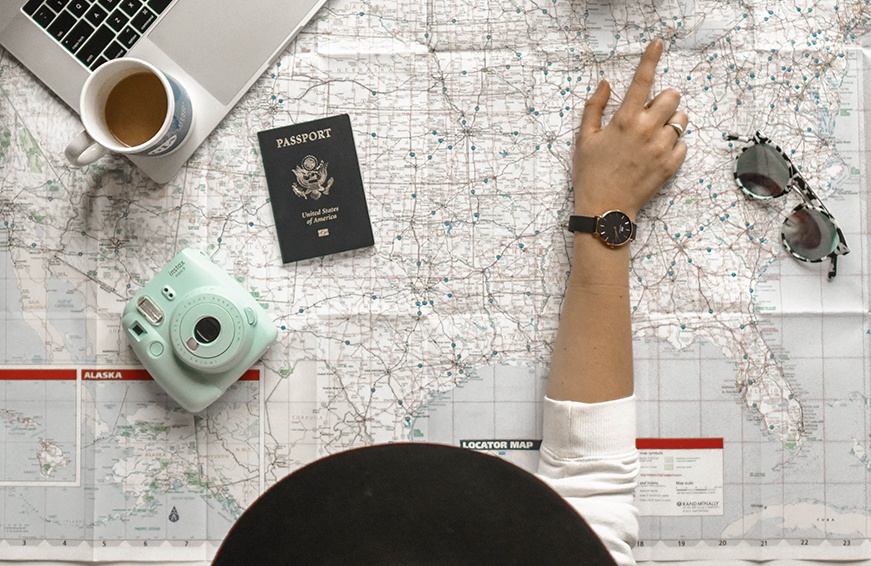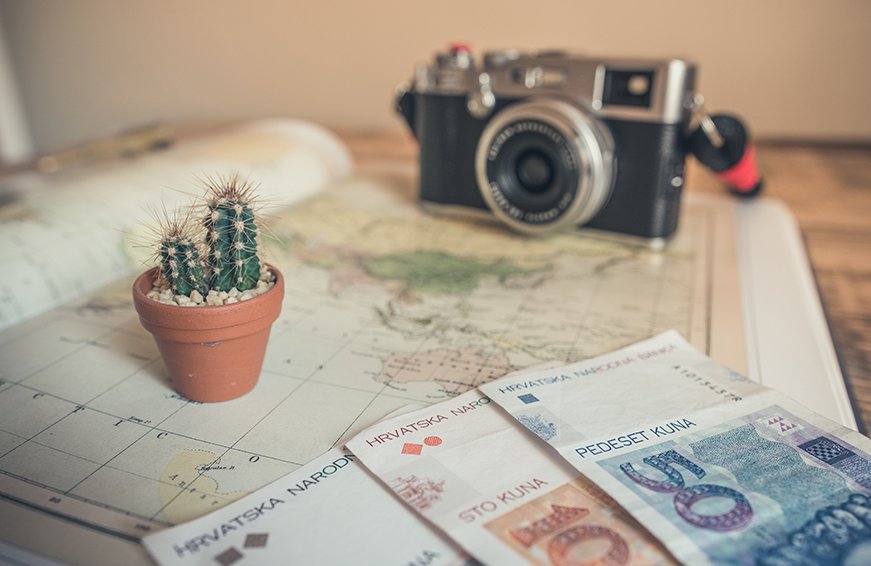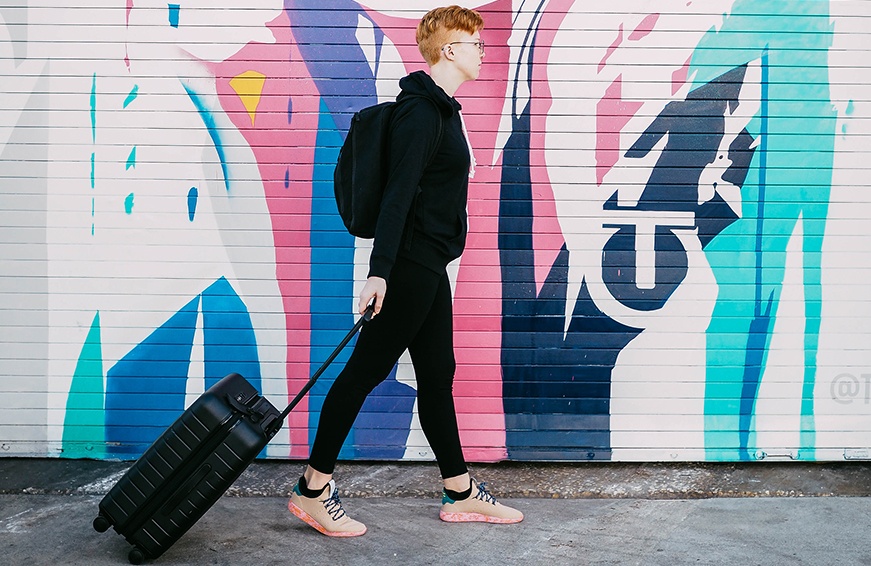As someone who is both a travel junkie and the former founder of a site called Broke Girl's Guide (RIP), which dealt in all things budget, I'm incredibly passionate about the idea that travel doesn't have to break the bank in order to be extraordinary. Don't believe me? Check out these top-rated, under-$100-per-night accommodations in destinations like Rome.
Below, globetrotting pros who feel similarly share their tips for seeing the world on a dime without sacrificing style, comfort, or sanity. But be warned: After reading this, you may no longer have an excuse to partake in your favorite 4 p.m. workday activity—enviously complaining about the "inaccessible" lives of travel bloggers.
Keep reading to get insider tips for traveling on the cheap.

Save money while traveling by bypassing peak times and locations
Pick an alternative destination. To save money, consider budget-friendly alternatives to more mainstream destinations, advises travel magazine Elsewhere founder Drea Sobieski, exchanging Paris for Porto or Fiji for Bali. You won't get exactly the same experience, of course, but you'll be able to more deeply and freely immerse yourself in the trip with fewer financial limitations. If you're really jonesing for a particular experience, she adds, you can always try selecting a town nearby your ideal destination instead (e.g. Taroudant vs. Marrakech). This way, you'll get similar vibes without tourist-inflated prices.

{{post.sponsorText}}
Book off-season. In some instances, non-ideal, off-season weather can kill your vacation, while in other cases, it's not such a big deal. When researching a destination, says travel blogger Ribicca Mamuye, AKA @IAmAbyssinia, evaluate how important it is that you arrive in peak season as you can save oodles by traveling to a place when most others are not.
Travel slow. The more destinations you try to see, says Sobieski, the more expensive your trip will get. "The faster we move from city to city, the more money we spend and the less we tend to see," she says, noting that plane, train, and bus tickets or car rentals add up quickly. "Slow travel invites us to select one destination instead of trying to explore an entire country in a week." Sites like Airbnb reward this mentality with discounts for extended stays, too.

Find the best travel deals by investing in the planning process
Do your research. Every traveler is different when it comes to how pre-plotted they prefer their itineraries to be. Still, the more you plan, the more you're likely to save. "From finding affordable accommodation to researching good restaurants that don't break the bank, it's all about planning ahead," says travel blogger Courtney Adamo, who took her sizable (and swoon-worthy) family traveling all over the world for a year.
Consider a pre-paid group trip. Generally speaking, group tours aren't the most budget-friendly way to travel; however, if you're not so great with planning, a pre-paid itinerary may be a good option to consider as it will prevent you from overspending once you get on the road.

How to save money on flights
Accrue and use mileage. Often times, airfare will be the most costly portion of your trip. For this reason, serious travel hackers engage all kinds of tricks for accumulating miles. For starters, signing up for a mileage-earning credit card is a no-brainer if you have good credit and if you commit to paying the balance down in full each month. Additionally, some airlines offer rewards programs wherein you can earn miles for the actions you take on a daily basis, like eating out at restaurants (e.g. AAdvantage Dining). I currently earn Delta SkyMiles every time I take a Lyft, too.
Know when and how to buy. If booking a ticket using miles isn't an option, however, there are other actions you can take to cut flight costs. For example, when you book matters. Flights booked in January tend to be cheapest, and Bon Weekender founder Olivia Lopez, AKA @Lusttforlife, further suggests trying for February, March, or October, when most people tend to be back to school and work. Don't forget to use an incognito browser when you search, too.
Skip in-flight flare. No-frills airlines such as WOW and Norwegian can be great budget-friendly options, too, particularly if you're flying overnight and plan to sleep—they don't offer WiFi, entertainment, or food and beverage service. When seeking out such flights, however, be sure to keep in mind the added costs of luggage—some basic fares don't even include an allowance for carry-ons anymore.
Utilize hub cities. Another flight hack I employ often is also a favorite of Tara Cappel, founder of For The Love Of Travel: booking alternate airports. "If I need to fly to Florence, which is a small airport, I might book a roundtrip to Rome and take the train up to Florence, which only costs around $40," she says. "I’ve saved as much as $600 doing this." This trick—flying into hub cities like London, Paris, or Rome and then tacking on a second transport leg to get to your target destination—can even be cost-efficient when flying to your second city. Local European airlines like easyJet, for example, offer tickets between cities for well under $50.

How to save money on your travel accommodations
Plan your stay for certain days. If you want to go the hotel route, Lopez suggests planning your trip over a Sunday and Monday, when rates are cheapest.
Earn and use points. Hotel junkies, says travel blogger Gillie Houston, may also want to consider signing up for a hotel-points-garnering credit card (the Marriott Rewards Premier Plus by Chase is her new personal favorite).
Go boutique. Another option—one that both I and travel writer Harriet Charnock-Bates subscribe to, has to do with the type of hotel in which you stay. "Smaller, boutique properties often offer lovelier, more authentic stays at a similar rate to the sprawling resorts—but they can take some finding," she says. I often start with advice sourced from respected travel sites and then do my due diligence on TripAdvisor before booking. Sometimes, I'll also start with a known, out-of-my-budget hotel in my ideal location and then search the area for other, more-affordable options.
Try a rental. All of that said, home rentals are almost always more cost-effective than are hotels for myriad reasons. "Renting apartments with kitchens can help make big savings on food costs," says Adamo. "Location matters too—find a place within walking distance of the shops, museums, parks, etc., and you’ll save on transport costs." Nervous about sleeping at a stranger's? Follow these tips for renting safely.
Sleep on trains. To further save on accommodations, Sobieski also advises taking overnight trains when moving between cities—the trip may be cheaper than a flight and it saves you the cost of a night in a hotel.

Create a travel budget
Consider the costs up front. Adamo recommends budgeting in advance so as not to return from a trip stressed out by the post-vacation size of your bank account. "We had a figure we thought the year [of travel] should cost, but once [my husband] Michael started plugging in realistic numbers for accommodation, food, transport and entertainment, he found we were 30-percent over our target," she says. "So, the next step was looking for ways to whittle this down." She tells me her husband uses Excel to budget, but that there are many apps (including free ones) you can utilize instead (e.g. Trail Wallet). Travel blogger Alivia Latimer also advises adding a cushion to your final budget number to allow for unexpected costs. "You will definitely have them!" she says.
Transport. Adamo and Sobieski agree that ground transportation can take a big bite out of your travel budget. Often, it's the to-and-fro to the airport that costs the most, which is why it's important to research alternatives—many cities offer buses, trains, and ride-shares which can lower these costs. Adamo also advises deciding when it might make the most sense to just rent a car, e.g. if a city is spread out and there's not adequate public transportation to get you from point A to point B daily.
Beyond this, Sobieski offers a fairly simple (and healthy!) solution. "Most places are easily transversed by bike or foot, which will not only provide deeper context and understanding of a place, but also allow you to discover some hidden gems you may have otherwise missed (all while saving money)," she says.
Food. As mentioned earlier, one easy way to save on food is to plan to prepare some percentage of your meals yourself. "Whenever we get somewhere, we stock up on simple breakfast foods (yogurts, cereals, fruits), lunch supplies, and snacks," says Adamo. She further recommends remembering your refillable, eco-friendly water bottle when you go out for the day, as this can save you money on beverages throughout your trip.
This isn't to say you should scrimp on your food budget entirely. "I'm such a fan of going to local cafes and coffee shops and trying food that's native to the area," Latimer says. Oftentimes, the more dive-y a spot, the more authentic the food and the lower the bill. For this reason, food halls and food trucks are good options, too, says Cappel. "Some of the best pizza in Rome is paid for by the kilo and only costs around 4 euro," she says. Finally, soliciting in-the-know advice is a best-practice strategy, too. "Talk to the locals and get insider tips," suggests Adamo.
Experiences. Personally, I prefer to skip uber-touristy sites when I travel, e.g. the Eiffel Tower (seeing it from the ground is awe-inspiring enough), as tickets for such activities tend to be overpriced; however, for those who must get the shot, Adamo offers cost-saving advice. "Do a bit of research before planning your activities each day," she says. "For example, when we were in Los Angeles, we discovered that some museums have a ‘free-entry’ day, so we made sure to visit then."
Houston, meanwhile, swears you can still make memories without spending tons of money, noting that she'll always cut corners in other areas of a trip in order to splurge on one really amazing experience: “Whether it’s hot air ballooning over the Teotihuacan pyramids in Mexico, ATVing through the Moroccan dessert, or sitting down for a pricey tasting menu at one of the world’s best restaurants, these more costly experiences tend to be the ones you remember for years to come.”
Souvenirs. "Back in the day, the main way you could share your travels with friends and family was to bring them a trinket from a place. [But now, with] Insta stories, Facebook posts, and Snapchats, it’s more than likely your family’s been following your every move daily and won’t need a magnet from that Hawaiian volcano you hiked to experience that place with you," Houston says, adding that as a rule, she'll let herself pick up just one special something from a destination. "That way, you can still have that tangible piece of the place you visited, but know you’re getting something that is truly special to you because you had to be especially selective in your decision-making," she says.
Adamo meanwhile, says that she and her husband ultimately decided they would allow their kids to buy stickers or badges from each destination which they could then attach to their suitcases or journals. "It was a pretty inexpensive way for us to collect a tiny souvenir from each place we visited," she says. On a similar tip, free stuff can become souvenirs, too—I have boxes full of receipts, ticket stubs, boarding passes and more from my travels which I cherish almost more so than I would a stuffed animal wearing an "I Heart 'Wherever" T-shirt.

Understand foreign traveling fees
To avoid foreign transaction fees when traveling, advises Adamo, be sure to sign up for credit cards which shun them. "The best cards change from time to time, but you can get lots of good advice on sites like Money Savings Expert," she says. She also advises against exchanging money at the airport, noting that doing so at banks will save you cash. Plus, she uses a money-transfer service called Azimo to easily pay for larger expenses such as lodging in the local currency when on the road.

Pack light
As mentioned above, your suitcase (or lack thereof) can really help you to save cash while traveling, particularly if you're going on a multi-country trip. "While most people know that you can hop around Europe for next-to-nothing on their budget airlines, what many don’t take into account is that those super-low fares don’t accommodate for extra baggage, which can quickly make your transportation budget skyrocket," says Houston. To avoid this, she advises packing only the essentials. "I traveled for six months last year with just a slightly-oversized backpack, and if you could see my overstuffed closet you’d know if I could do it, anyone can!" Latimer agrees, noting that she always limits herself to a carry-on only.
Flying solo on your travels? Here's everything you need to know about going it alone. Plus, get the scoop on how to avoid tourist traps for a more authentic experience.
Loading More Posts...